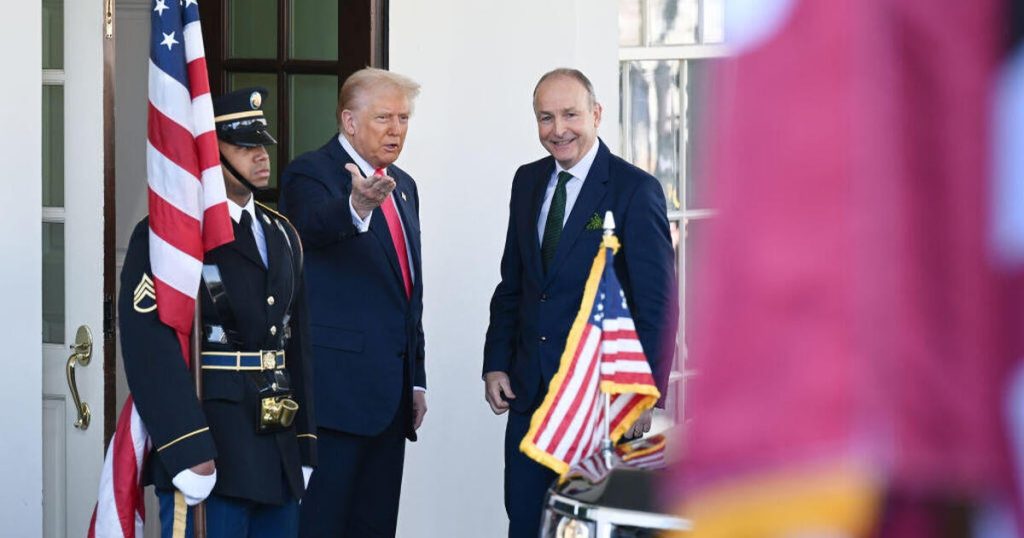In a recent interview, Irish Taoiseach Micheál Martin expressed optimism regarding the potential resolution of the ongoing trade conflict between the U.S. and the European Union. This statement came after U.S. President Donald Trump threatened new retaliatory tariffs of up to 200% on European wines and spirits. The escalating trade tensions arise as both sides retaliate against each other’s tariffs on steel and aluminum, which have created uncertainties for businesses and consumers alike.
| Article Subheadings |
|---|
| 1) Overview of the Trade Tensions |
| 2) Economic Impacts of Tariffs |
| 3) Ireland’s Role in U.S. Economy |
| 4) Positive Dialogue with President Trump |
| 5) Future Outlook for Trade Relations |
Overview of the Trade Tensions
The trade war between the United States and the European Union has intensified in recent weeks, particularly after President Donald Trump announced plans to impose significant tariffs on European wines and alcoholic beverages. The suggested tariffs of up to 200% represent a reaction to counter-tariffs levied by the EU in response to earlier U.S. tariffs on imported steel and aluminum. The situation has created considerable uncertainty within both the American and European markets, as businesses navigate the implications of these escalating trade barriers. According to Micheál Martin, this trade friction not only poses risks for trade but also threatens to elevate prices for consumers, leading to broader economic consequences.
Economic Impacts of Tariffs
Tariffs invariably lead to increased costs for businesses and consumers alike, as illustrated by statements from economic leaders. Aengus Kelly, CEO of AerCap, emphasized that a hypothetical 25% increase in tariffs could drive up the costs of large aircraft, such as the Boeing 787, by as much as $40 million per unit. This increase could deter purchases from U.S. manufacturers, leading European companies to favor alternatives like Airbus, a European competitor. Moreover, these retaliatory tariffs can create ripple effects throughout the economy, impacting various sectors that rely on international trade, from manufacturing and agriculture to services.
Ireland’s Role in U.S. Economy
Despite the challenges posed by these tariff disputes, Micheál Martin conveyed a positive view of the economic relationship between Ireland and the United States. He highlighted that over 700 Irish companies operate within the U.S. and contribute significantly to job creation, with estimates of more than 50,000 jobs facilitated through these businesses. This contribution underscores the deep economic ties that exist between the two nations. In addition, Ryanair, an Irish low-cost airline, has made significant investments in U.S. aviation, including an order for more than 400 Boeing jets. Martin noted that Irish companies have become the largest non-U.S. purchasers of Boeing aircraft, thus solidifying Ireland’s influential role within the international supply chain.
Positive Dialogue with President Trump
In light of the trade tensions, Micheál Martin characterized his recent meetings with President Donald Trump at the White House as constructive and positive. During these discussions, Martin emphasized the historical ties that bind the two countries and praised Trump’s hospitality. He pointed out that Trump has a personal connection to Ireland, noting that the U.S. president has significant investments in the country and an understanding of the Irish-American experience.
“He likes Ireland. He has an investment in Ireland,”
Martin stated, reflecting the mutual recognition of each country’s historical and economic ties.
Future Outlook for Trade Relations
Looking forward, Micheál Martin expressed hope that ongoing dialogue could lead to a resolution of trade disputes between the U.S. and the EU. He acknowledged the uncertainty that currently looms over the market and the potential consequences for businesses and consumers.
“Overall, tariffs are damaging to trade, damaging to businesses, but also damaging to consumers, because they will lead to an increase in prices for consumers,”
he said, stressing the need for negotiations to establish a more stable trading environment. Martin’s optimistic outlook hinges on the belief that collaborative discussions can pave the way for a balanced agreement benefiting both sides.
| No. | Key Points |
|---|---|
| 1 | President Trump has proposed 200% tariffs on European wines and spirits as retaliation against EU tariffs. |
| 2 | Tariffs are expected to increase consumer prices and create complications for international trade relations. |
| 3 | Ireland is heavily invested in the U.S. economy, contributing significantly to job creation through Irish companies. |
| 4 | Martin described his meetings with Trump as positive, indicating a strong historical relationship between Ireland and the U.S. |
| 5 | There is hope for resolution through dialogue, with discussions aimed at establishing mutually agreeable trade policies. |
Summary
In conclusion, the escalating trade tensions between the United States and the European Union have prompted significant concern among businesses and consumers. Amidst threats of immense retaliatory tariffs, Irish Taoiseach Micheál Martin emphasized the importance of dialogue to resolve conflicts and mitigate economic impacts. As both nations navigate the complexity of trade relations, the focus remains on fostering negotiations that respect the contributions of international partnerships. The invested interests of both sides highlight the need for a stable trading environment that promotes mutual growth.
Frequently Asked Questions
Question: What are the implications of the new tariffs proposed by President Trump?
The implications of these proposed tariffs could lead to increased prices for consumers and disruptions in trade. If implemented, businesses may face higher costs for imported goods and could potentially pass these costs onto consumers.
Question: How does Ireland contribute to the U.S. economy?
Ireland contributes significantly to the U.S. economy through its numerous companies that operate stateside, creating thousands of jobs and participating in key industries, including pharmaceuticals and aviation.
Question: What steps can be taken to resolve trade disputes?
Resolving trade disputes typically involves diplomatic discussions between the affected parties, focusing on negotiation and compromise to address the underlying issues without resorting to retaliatory tariffs.


